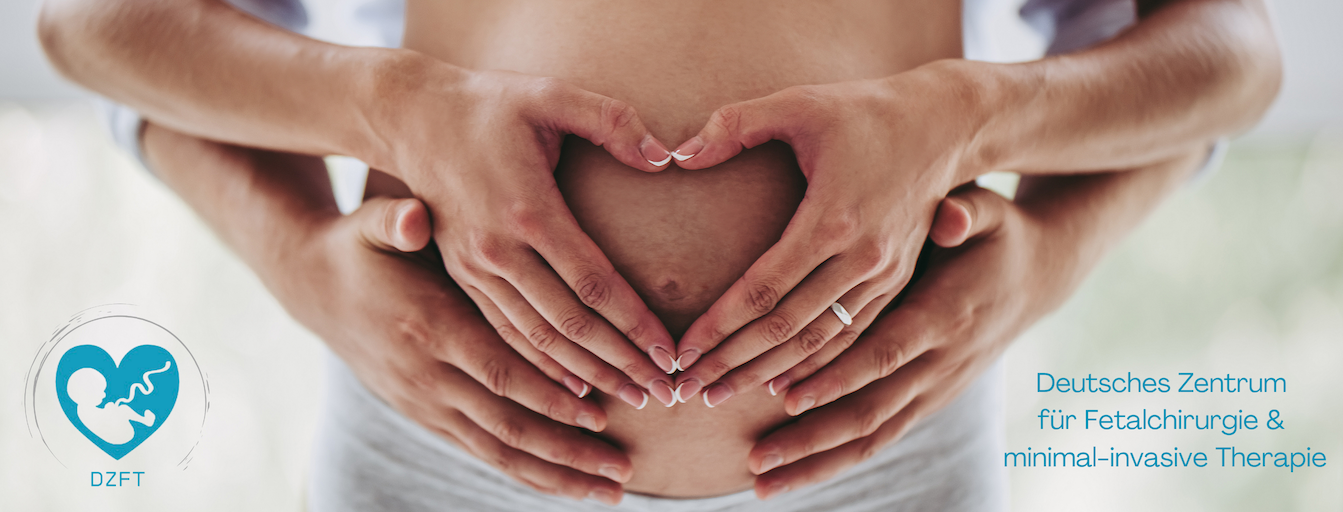In some unborn babies, an ultrasound examination reveals that there is little or no amniotic fluid present (oligohydramnios; anhydramnios). If premature rupture of the membranes can be ruled out, the cause is usually a lack of or severe dysfunction of the kidneys.
Therefore, if oligohydramnios or anhydramnios is diagnosed and there has been no previous vaginal discharge of amniotic fluid, the kidneys and the bladder of the fetus should always be examined. It is recommended to consult a specialist practice or center for this.
Highly suspicious signs of a causal kidney disease include an empty bladder, a flaccid and at the same time slightly enlarged bladder, but also significantly enlarged or much too small kidneys, kidneys with cysts, conspicuously light-colored kidneys, or the complete absence of kidneys (bilateral renal agenesis). Affected parents often report their own kidney problems or other cases of kidney disease in their families.
Most prenatal doctors in Germany recommend termination of pregnancy in cases of fetal kidney disease and lack of amniotic fluid. The reasons given for this are “unavoidable damage” due to the development of lungs that are far too small, as well as the lack of postnatal treatment methods to replace the kidneys.
Both reasons are incorrect, as severe lung development in children can be counteracted by prenatal amniotic fluid supplementation. And because, even in this country, effective renal replacement therapy (peritoneal dialysis) has been available for many years for newborns with kidney disease who produce little or no urine. Peritoneal dialysis is followed by a kidney transplant after a few years of life.
For this reason, we are the first German treatment center to systematically prepare unborn babies affected by renal insufficiency for the necessary postnatal treatment and peritoneal dialysis through prenatal serial amniotic fluid replenishment.
What can I do if my child has no functioning kidneys or no kidneys (renal agenesis) and I want to save my child’s life?
Since most unborn babies who are candidates for peritoneal dialysis have not excreted urine for several months before birth, without prenatal therapy their lungs would become dangerously underdeveloped. Approximately 90% of unborn babies with several months of amniotic fluid deficiency who are not treated prenatally for lung hypoplasia would die.
In order to halt this process and achieve adequate lung function in the child for postnatal peritoneal dialysis, our center effectively prevents lung hypoplasia primarily with the help of repeated amniotic fluid infusions.
Only in rare cases is it necessary to insert a balloon into the child’s windpipe (FETO) to improve the size and function of the already significantly undersized fetal lungs.
The survival chances of children threatened by lung hypoplasia can be increased to over 80 percent through serial amniotic fluid replenishment alone. We would be happy to advise you on your individual case and put you in touch with other families.
Successful teamwork
As part of the postnatal renal replacement therapy for children treated or monitored prenatally at our center, we have been working for many years with the experienced treatment teams of Prof. Dr. med. Thomas Schaible and Prof. Dr. med. Franz Schäfer at Heidelberg University Hospital. New patients who come to us also have the opportunity to consult Prof. Schäfer personally.
Patient comfort and safety are our top priorities
All prenatal amniotic fluid replenishment procedures are performed at our center from the 20th week of pregnancy after administration of a painkiller, under local anesthesia, and with antibiotic prophylaxis. Tracheal balloon occlusion (FETO) is performed under general anesthesia for both mother and child.
Thanks to these measures, the technical success rate at our center is well over 90%, even under very difficult conditions. No procedure-related infections have been observed. In addition, rupture of the amniotic sac, other complications in the child, or infections are rare. The stress caused by the procedure for both mother and child is also reduced to a minimum. In our opinion, this is an indispensable advantage, especially in the case of repeated procedures.
As incredible as it may sound, pain management for mothers and babies and infection prevention through procedures performed in a dedicated operating room with the administration of antibiotics are still not standard practice for prenatal procedures in Germany! Please consider these important factors when choosing your treatment center!
If you have any further questions about this prenatal treatment or would like to obtain a second opinion, please contact the DZFT daily between 10 a.m. and 5 p.m. on 0175/597-1213 or send us an email.
If you only reach the answering machine, please leave your name and a phone number where we can call you back.
If you have already decided to have the procedure performed at another clinic, we will be happy to advise you in this case as well and offer a prognostic second opinion on your child’s condition and treatment.
